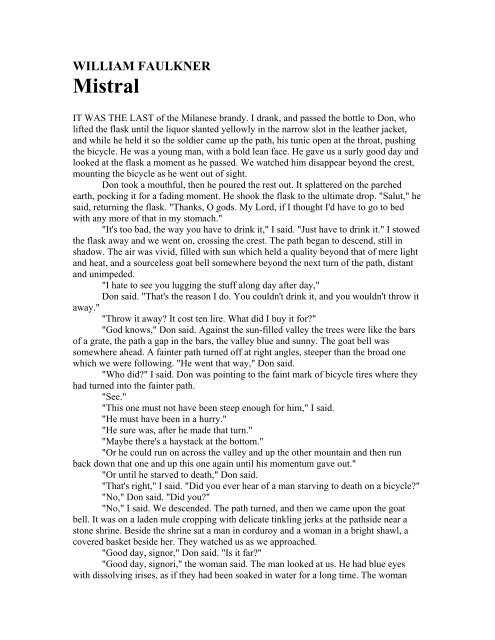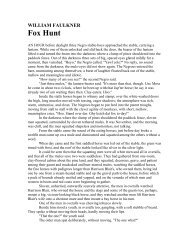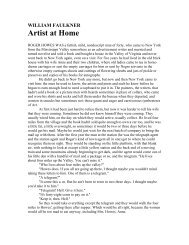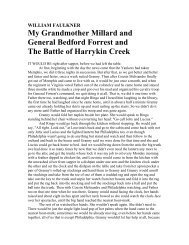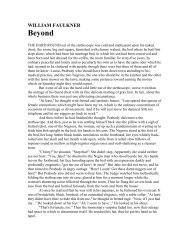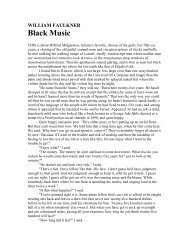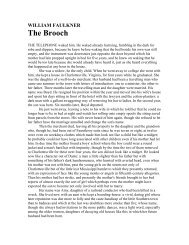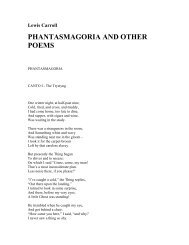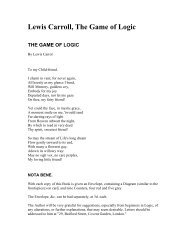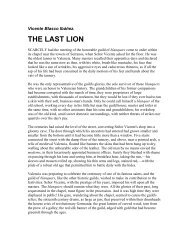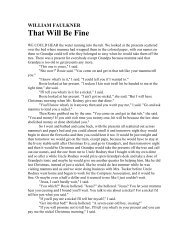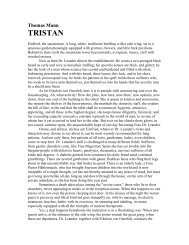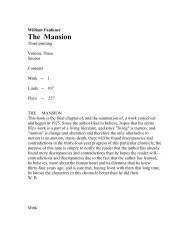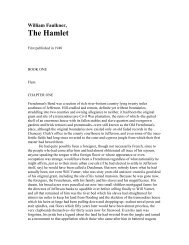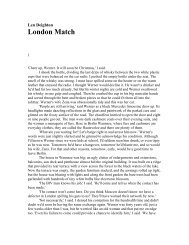WILLIAM FAULKNER, Mistral - literature save 2
WILLIAM FAULKNER, Mistral - literature save 2
WILLIAM FAULKNER, Mistral - literature save 2
You also want an ePaper? Increase the reach of your titles
YUMPU automatically turns print PDFs into web optimized ePapers that Google loves.
<strong>WILLIAM</strong> <strong>FAULKNER</strong><strong>Mistral</strong>IT WAS THE LAST of the Milanese brandy. I drank, and passed the bottle to Don, wholifted the flask until the liquor slanted yellowly in the narrow slot in the leather jacket,and while he held it so the soldier came up the path, his tunic open at the throat, pushingthe bicycle. He was a young man, with a bold lean face. He gave us a surly good day andlooked at the flask a moment as he passed. We watched him disappear beyond the crest,mounting the bicycle as he went out of sight.Don took a mouthful, then he poured the rest out. It splattered on the parchedearth, pocking it for a fading moment. He shook the flask to the ultimate drop. "Salut," hesaid, returning the flask. "Thanks, O gods. My Lord, if I thought I'd have to go to bedwith any more of that in my stomach.""It's too bad, the way you have to drink it," I said. "Just have to drink it." I stowedthe flask away and we went on, crossing the crest. The path began to descend, still inshadow. The air was vivid, filled with sun which held a quality beyond that of mere lightand heat, and a sourceless goat bell somewhere beyond the next turn of the path, distantand unimpeded."I hate to see you lugging the stuff along day after day,"Don said. "That's the reason I do. You couldn't drink it, and you wouldn't throw itaway.""Throw it away? It cost ten lire. What did I buy it for?""God knows," Don said. Against the sun-filled valley the trees were like the barsof a grate, the path a gap in the bars, the valley blue and sunny. The goat bell wassomewhere ahead. A fainter path turned off at right angles, steeper than the broad onewhich we were following. "He went that way," Don said."Who did?" I said. Don was pointing to the faint mark of bicycle tires where theyhad turned into the fainter path."See.""This one must not have been steep enough for him," I said."He must have been in a hurry.""He sure was, after he made that turn.""Maybe there's a haystack at the bottom.""Or he could run on across the valley and up the other mountain and then runback down that one and up this one again until his momentum gave out.""Or until he starved to death," Don said."That's right," I said. "Did you ever hear of a man starving to death on a bicycle?""No," Don said. "Did you?""No," I said. We descended. The path turned, and then we came upon the goatbell. It was on a laden mule cropping with delicate tinkling jerks at the pathside near astone shrine. Beside the shrine sat a man in corduroy and a woman in a bright shawl, acovered basket beside her. They watched us as we approached."Good day, signor," Don said. "Is it far?""Good day, signori," the woman said. The man looked at us. He had blue eyeswith dissolving irises, as if they had been soaked in water for a long time. The woman
touched his arm, then she made swift play with her fingers before his face. He said, in adry metallic voice like a cicada's: "Good day, signori.""He doesn't hear any more," the woman said. "No, it is not far. From yonder youwill see the roofs.""Good," Don said. "We are fatigued. Might one rest here, signora?""Rest, signori," the woman said. We slipped our packs and sat down. The sunslanted upon the shrine, upon the serene, weathered figure in the niche and upon twobunches of dried mountain asters lying there. The woman was making play with herfingers before the man's face. Her other hand in repose upon the basket beside her wasgnarled and rough. Motionless, it had that rigid quality of unaccustomed idleness, notrestful so much as quite spent, dead. It looked like an artificial hand attached to the edgeof the shawl, as if she had donned it with the shawl for conventional complement. Theother hand, the one with which she talked to the man, was swift and supple as aprestidigitator's.The man looked at us. "You walk, signori," he said in his light, cadenceless voice."Si," we said. Don took out the cigarettes. The man lifted his hand in a slight,deprecatory gesture. Don insisted. The man bowed formally, sitting, and fumbled at thepack. The woman took the cigarette from the pack and put it into his hand. He bowedagain as he accepted a light. "From Milano," Don said. "It is far.""It is far," the woman said. Her fingers rippled briefly."He has been there," she said."I was there, signori," the man said. He held the cigarette carefully betweenthumb and forefinger. "One takes care to escape the carriages.""Yes." Don said. "Those without horses.""Without horses," the woman said. "There are many. Even here in the mountainswe hear of it.""Many," Don said. "Always whoosh. Whoosh. Whoosh.""Si," the woman said. "Even here I have seen it." Her hand rippled in the sunlight.The man looked at us quietly, smoking. "It was not like that when he was there, you see,"she said."I am there long time ago, signori," he said. "It is far."He spoke in the same tone she had used, the same tone of grave and courteousexplanation."It is far," Don said. We smoked. The mule cropped with delicate, jerking tinklesof the bell. "But we can rest yonder," Don said, extending his hand toward the valleyswimming blue and sunny beyond the precipice where the path turned. "A bowl of soup,wine, a bed?"The woman watched us across that serene and topless rampart of the deaf, thecigarette smoking close between thumb and finger. The woman's hand flickered beforehis face. "Si," he said; "si. With the priest: why not? The priest will take them in." Hesaid something else, too swift for me. The woman removed the checked cloth whichcovered the basket, and took out a wineskin. Don and I bowed and drank in turn, the manreturning the bows."Is it far to the priest's?" Don said.The woman's hand flickered with unbelievable rapidity.
Her other hand, lying upon the basket, might have belonged to another body. "Letthem wait for him there, then," the man said. He looked at us. "There is a funeral today.You will find him at the church. Drink, signori."We drank in decorous turn, the three of us. The wine was harsh and sharp andpotent. The mule cropped, its small bell tinkling, its shadow long in the slanting sun,across the path. "Who is it that's dead, signora?" Don said."He was to have married the priest's ward after this harvest," the woman said; "thebanns were read and all. A rich man, and not old. But two days ago, he died."The man watched her lips. "Tchk. He owned land, a house: so do I. It is nothing.""He was rich," the woman said. "Because he was both young and fortunate, myman is jealous of him.""But not now," the man said. "Eh, signori?""To live is good," Don said. He said, e hello."It is good," the man said; he also said, bello."He was to have married the priest's niece, you say," Don said."She is no kin to him," the woman said. "The priest just raised her. She was sixwhen he took her, without people, kin, of any sort. The mother was workhouse-bred. Shelived in a hut on the mountain yonder. It was not known who the father was, although thepriest tried for a long while to persuade one of them to marry her for the child's...""One of which?" Don said."One of those who might have been the father, signor. But it was never knownwhich one it was, until in 1916. He was a young man, a laborer; the next day we learnedthat the mother had gone too, to the war also, for she was never seen again by those whoknew her until one of our boys came home after Caporetto, where the father had beenkilled, and told how the mother had been seen in a house in Milano that was not a goodhouse. So the priest went and got the child. She was six then, brown and lean as a lizard.She was hidden on the mountain when the priest got there; the house was empty. Thepriest pursued her among the rocks and captured her like a beast: she was half naked andwithout shoes and it winter time.""So the priest kept her," Don said. "Stout fellow.""She had no people, no roof, no crust to call hers <strong>save</strong> what the priest gave her.But you would not know it. Always with a red or a green dress for Sundays and feastdays, even at fourteen and fifteen, when a girl should be learning modesty and industry,to be a crown to her husband. The priest had told that she would be for the church, andwe wondered when he would make her put such away for the greater glory of God. But atfourteen and fifteen she was already the brightest and loudest and most tireless in thedances, and the young men already beginning to look after her, even after it had beenarranged between her and him who is dead yonder.""The priest changed his mind about the church and got her a husband instead,"Don said."He found for her the best catch in this parish, signor. Young, and rich, with anew suit each year from the Milano tailor. Then the harvest came, and what do you think,signori? she would not marry him.""I thought you said the wedding was not to be until after this harvest," Don said."You mean, the wedding had already been put off a year before this harvest?"
"It had been put off for three years. It was made three years ago, to be after thatharvest. It was made in the same week that Giulio Farinzale was called to the army. Iremember how we were all surprised, because none had thought his number would comeup so soon, even though he was a bachelor and without ties <strong>save</strong> an uncle and aunt.""Is that so?" Don said. "Governments surprise everybody now and then. How didhe get out of it?""He did not get out of it.""Oh. That's why the wedding was put off, was it?"The woman looked at Don for a minute. "Giulio was not the fiance's name.""Oh, I see. Who was Giulio?"The woman did not answer at once. She sat with her head bent a little. The manhad been watching their lips when they spoke. "Go on," he said; "tell them. They aremen: they can listen to women's tittle-tattle with the ears alone. They cackle, signori; givethem a breathing spell, and they cackle like geese. Drink.""He was the one she used to meet by the river in the evenings; he was youngerstill: that was why we were surprised that his number should be called so soon. Before wehad thought she was old enough for such, she was meeting him. And hiding it from thepriest as skillfully as any grown woman could..." For an instant the man's washed eyesglinted at us, quizzical."She was meeting this Giulio all the while she was engaged to the other one?"Don said."No. The engagement was later. We had not thought her old enough for such yet.When we heard about it, we said how an anonymous child is like a letter in the postoffice: the envelope might look like any other envelope, but when you open it.. And theholy can be fooled by sin as quickly as you or I, signori. Quicker, because they are holy.""Did he ever find it out?" Don said."Yes. It was not long after. She would slip out of the house at dusk; she was seen,and the priest was seen, hidden in the garden to watch the house: a servant of the holyGod forced to play watchdog for the world to see. It was not good, signori.""And then the young man got called suddenly to the army," Don said. "Is thatright?""It was quite sudden; we were all surprised. Then we thought that it was the handof God, and that now the priest would send her to the convent. Then in that same weekwe learned that it was arranged between her and him who is dead yonder, to be after theharvest, and we said it was the hand of God that would confer upon her a husband beyondher deserts in order to protect His servant. For the holy are susceptible to evil, even asyou and I, signori; they too are helpless before sin without God's aid.""Tchk, tchk," the man said. "It was nothing. The priest looked at her, too," hesaid. "For a man is a man, even under a cassock. Eh, signori?""You would say so," the woman said. "You without grace.""And the priest looked at her, too," Don said."It was his trial, his punishment, for having been too lenient with her. And thepunishment was not over: the harvest came, and we heard that the wedding was put offfor a year: what do you think of that, signori? that a girl, come from what she had comefrom, to be given the chance which the priest had given her to <strong>save</strong> her from herself, fromher blood... We heard how they quarreled, she and the priest, of how she defied him,
slipping out of the house after dark and going to the dances where her fiance might seeher or hear of it at any time.""Was the priest still looking at her?" Don said."It was his punishment, his expiation. So the next harvest came, and it was put offagain, to be after the next harvest; the banns were not even begun. She defied him to thatextent, signori, she, a pauper, and we all saying, 'When will her fiance hear of it, learnthat she is no good, when there are daughters of good houses who had learned modestyand seemliness?'""You have unmarried daughters, signora?" Don said."Si. One. Two have I married, one still in my house. A good girl, signori, if I dosay it.""Tchk, woman," the man said."That is readily believed," Don said. "So the young man had gone to the army,and the wedding was put off for another year.""And another year, signori. And then a third year. Then it was to be after thisharvest; within a month it was to have been. The banns were read; the priest read themhimself in the church, the third time last Sunday, with him there in his new Milano suitand she beside him in the shawl he had given her: it cost a hundred lire and a goldenchain, for he gave her gifts suitable for a queen rather than for one who could not nameher own father, and we believed that at last the priest had served his expiation out andthat the evil had been lifted from his house at last, since the soldier's time would also beup this fall. And now the fiance is dead.""Was he very sick?" Don said."It was very sudden. A hale man; one you would have said would live a longtime. One day he was well, the second day he was quite sick. The third day he was dead.Perhaps you can hear the bell, with listening, since you have young ears."The opposite mountains were in shadow. Between, the valley lay invisible still. Inthe sunny silence the mule's bell tinkled in random jerks. "For it is in God's hands," thewoman said."Who will say that his life is his own?""Who will say?" Don said. He did not look at me. He said in English: "Give me acigarette.""You've got them.""No, I haven't.""Yes, you have. In your pants pocket."He took out the cigarettes. He continued to speak in English. "And he diedsuddenly. And he got engaged suddenly. And at the same time, Giulio got draftedsuddenly. It would have surprised you. Everything was sudden except somebody'seagerness for the wedding to be. There didn't seem to be any hurry about that, did there?""I don't know. I no spika.""In fact, they seemed to stop being sudden altogether until about time for Giulioto come home again. Then it began to be sudden again. And so I think I'll ask if priestsserve on the draft boards in Italy." The old man watched his lips, his washed gaze graveand intent. "And if this path is the main path down the mountain, and that bicycle turnedoff into that narrow one back there, what do you think of that, signori?"
"I think it was fine. Only a little sharp to the throat. Maybe we can get somethingdown there to take away the taste."The man was watching our lips; the woman's head was bent again; her stiff handsmoothed the checked cover upon the basket. "You will find him at the church, signori,"the man said."Yes," Don said. "At the church."We drank again. The man accepted another cigarette with that formal andunfailing politeness, conferring upon the action something finely ceremonious yet notincongruous.The woman put the wineskin back into the basket and covered it again. We roseand took up our packs."You talk swiftly with the hand, signora," Don said."He reads the lips too. The other we made lying in the bed in the dark. The old donot sleep so much. The old lie in bed and talk. It is not like that with you yet.""It is so. You have made the padrone many children, signora?""Si. Seven. But we are old now. We lie in bed and talk."IIBEFORE WE REACHED the village the bell had begun to toll.From the gaunt steeple of the church the measured notes seemed to blow free asfrom a winter branch, along the wind.The wind began as soon as the sun went down. We watched the sun touch themountains, whereupon the sky lost its pale, vivid blueness and took on a faintly greenishcast, like glass, against which the recent crest, where the shrine faded with the driedhandful of flowers beneath the fading crucifix, stood black and sharp. Then the windbegan: a steady moving wall of air full of invisible particles of something. Before it thebranches leaned without a quiver, as before the pressure of an invisible hand, and in it ourblood began to cool at once, even before we had stopped walking where the path becamea cobbled street.The bell still tolled. "Funny hour for a funeral," I said. "You'd think he wouldhave kept a long time at this altitude. No need to be hurried into the ground like this.""He got in with a fast gang," Don said. The church was invisible from here, shutoff by a wall. We stood before a gate, looking into a court enclosed by three walls androofed by a vine on a raftered trellis. It contained a wooden table and two backlessbenches. We stood at the gate, looking into the court, when Don said. "So this is Uncle'shouse.""Uncle?""He was without ties <strong>save</strong> an uncle and aunt," Don said."Yonder, by the door." The door was at the bottom of the court. There was a firebeyond it, and beside the door a bicycle leaned against the wall. "The bicycle,unconscious," Don said."Is that a bicycle?""Sure. That's a bicycle." It was an old-style machine, with high back-swepthandlebars like gazelle horns. We looked at it.
"The other path is the back entrance," I said. "The family entrance." We heard thebell, looking into the court."Maybe the wind doesn't blow in there," Don said. "Besides, there's no hurry. Wecouldn't see him anyway, until it's over.""These places are hotels sometimes." We entered. Then we saw the soldier. Whenwe approached the table he came to the door and stood against the firelight, looking at us.He wore a white shirt now. But we could tell him by his legs.Then he went back into the house."So Malbrouck is home," Don said."Maybe he came back for the funeral." We listened to the bell. The twilight wasthicker inside. Overhead the leaves streamed rigid on the wind, stippled black upon thelivid translucent sky. The strokes of the bell sounded as though they too were leavesflattening away upon an inviolable vine in the wind."How did he know there was going to be one?" Don said."Maybe the priest wrote him a letter.""Maybe so," Don said. The firelight looked good beyond the door. Then a womanstood in it, looking at us. "Good day, padrona," Don said. "Might one have a mouthful ofwine here?" She looked at us, motionless against the firelight.She was tall. She stood tall and motionless against the firelight, not touching thedoor. The bell tolled. "She used to be a soldier too," Don said. "She was a sergeant.""Maybe she was the colonel who ordered Malbrouck to go home.""No. He wasn't moving fast enough when he passed us up yonder, for it to havebeen her." Then the woman spoke: "It is so, signori. Rest yourselves." She went back intothe house. We slipped our packs and sat down. We looked at the bicycle."Cavalry," Don said. "Wonder why he came the back way.""All right," I said."All right what?""All right. Wonder.""Is that a joke?""Sure. That's a joke. It's because we are old. We lie in the draft. That's a joke too.""Tell me something that's not a joke.""All right.""Did you hear the same thing I think I heard up there?""No spika. I love Italy. I love Mussolini." The woman brought the wine. She set iton the table and was turning away. "Ask her," I said. "Why don't you?""All right. I will. You have military in the house, signora?"The woman looked at him. "It is nothing, signor. It is my nephew returned.""Finished, signora?""Finished, signor.""Accept our felicitations. He has doubtless many friends who will rejoice at hisreturn." She was thin, not old, with cold eyes, looking down at Don with brusqueattention, waiting. "You have a funeral in the village today." She said nothing at all. Shejust stood there, waiting for Don to get done talking. "He will be mourned," Don said."Let us hope so," she said. She made to go on; Don asked her about lodgings.There were none, she answered with immediate finality. Then we realized that the bellhad ceased.
We could hear the steady whisper of the wind in the leaves overhead."We were told that the priest..." Don said."Yes? You were told that the priest.""That we might perhaps find lodgings there.""Then you would do well to see the priest, signor." She returned to the house. Shestrode with the long stride of a man into the firelight, and disappeared. When I looked atDon, he looked away and reached for the wine."Why didn't you ask her some more?" I said. "Why did you quit so soon?""She was in a hurry. Her nephew is just home from the army, she said. He camein this afternoon. She wants to be with him, since he is without ties.""Maybe she's afraid he'll be drafted.""Is that a joke too?""It wouldn't be to me." He filled the glasses. "Call her back. Tell her you heardthat her nephew is to marry the priest's ward. Tell her we want to give them a present. Astomach pump. That's not a joke, either.""I know it's not." He filled his glass carefully. "Which had you rather do, or stayat the priest's tonight?""Salut," I said."Salut." We drank. The leaves made a dry, wild, continuous sound. "Wish it wasstill summer.""It would be pretty cold tonight, even in a barn.""Yes. Glad we don't have to sleep in a barn tonight.""It wouldn't be so bad, after we got the hay warm and got to sleep.""We don't have to, though. We can get a good sleep and get an early start in themorning."I filled the glasses. "I wonder how far it is to the next village.""Too far." We drank. "I wish it were summer. Don't you?""Yes." I emptied the bottle into the glasses. "Have some wine." We raised ourglasses. We looked at one another. The particles in the wind seemed to drive through theclothing, through the flesh, against the bones, penetrating the brick and plaster of thewalls to reach us. "Salut.""We said that before," Don said."All right. Salut, then.""Salut."We were young: Don, twenty-three; I, twenty-two. And age is so much a part of,so inextricable from, the place where you were born or bred. So that away from home,some distance away space or time or experience away you are always both older andeternally younger than yourself, at the same time.We stood in the black wind and watched the funeral: priest, coffin, a meagerclump of mourners pass, their garments, and particularly the priest's rusty black,ballooning ahead of them, giving an illusion of unseemly haste, as though they wereoutstripping themselves across the harsh green twilight (the air was like having to drinkiced lemonade in the winter time) and into the church. "We'll be out of the wind too,"Don said."There's an hour of light yet."
"Sure; we might even reach the crest by dark." He looked at me. Then I lookedaway. The red tiles of the roofs were black, too, now. "We'll be out of the wind." Thenthe bell began to toll again. "We don't know anything. There's probably not anything.Anyway, we don't know it. We don't have to know it. Let's get out of the wind." It wasone of those stark, square, stone churches, built by those harsh iron counts and bishops ofLombardy. It was built old; time had not even mellowed it, could not ever mellow it, notall of time could have. They might have built the mountains too and invented the twilightin a dungeon underground, in the black ground.And beside the door the bicycle leaned. We looked at it quietly as we entered thechurch and we said quietly, at the same time: "Beaver.""He's one of the pallbearers," Don said. "That's why he came home." The belltolled. We passed through the chancel and stopped at the back of the church. We were outof the wind now, <strong>save</strong> for the chill eddies of it that licked in at our backs. We could hearit outside, ripping the slow strokes of the bell half-born out of the belfry, so that by thetime we heard them, they seemed to have come back as echoes from a far distance. Thenave, groined upward into the gloom, dwarfed the meager clot of bowed figures. Beyondthem, above the steady candles, the Host rose, soaring into sootlike shadows likefestooned cobwebs, with a quality sorrowful and triumphant, like wings. There was noorgan, no music, no human sound at all at first. They just knelt there among the dwarfinggloom and the cold, serene, faint light of the candles. They might have all been dead."It'll be dark long before they can get done," Don whispered."Maybe it's because of the harvest," I whispered. "They probably have to work allday. The living can't wait on the dead, you know.""But, if he was as rich as they told us he was, it seems like...""Who buries the rich? Do the rich do it, or do the poor do it?""The poor do it," Don whispered. Then the priest was there, above the bowedheads. We had not seen him at first, but now he was there, shapeless, blurring out of theshadows below the candles, his face like a smudge, a thumb print, upon the gloom wherethe Host rose in a series of dissolving gleams like a waterfall; his voice filled the church,slow, steady, like wings beating against the cold stone, upon the resonance of wind inwhich the windless candles stood as though painted. "And so he looked at her," Donwhispered."He had to sit across the table from her, say, and watch her. Watch her eating thefood that made her change from nothing and become everything, knowing she had nofood of her own and that it was his food that was doing it, and not for him changing. Youknow, girls: they are not anything, then they are everything. You watch them becomeeverything before your eyes. No, not eyes: it's the same in the dark. You know it beforethey do; it's not their becoming everything that you dread: it's their finding it out after youhave long known it: you die too many times. And that's not right. Not fair. I hope I'llnever have a daughter.""That's incest," I whispered."I never said it wasn't. I said it was like fire. Like watching the fire lean up andaway rushing.""You must either watch a fire, or burn up in it. Or not be there at all. Which wouldyou choose?""I don't know. If it was a girl, I'd rather burn up in it."
"Than to not be there at all, even?""Yes." Because we were young. And the young seem to be impervious toanything except trifles. We can invest trifles with a tragic profundity, which is the world.Because, after all, there's nothing particularly profound about reality.Because when you reach reality, along about forty or fifty or sixty, you find it tobe only six feet deep and eighteen feet square.Then it was over. Outside again, the wind blew steadily down from the blackhills, hollowing out the green glass bowl of the sky. We watched them file out of thechurch and carry the coffin into the churchyard. Four of them carried iron lanterns and inthe dusk they clotted quietly antic about the grave while the wind leaned steadily uponthem and upon the lantern flames, and blew fine dust into the grave as though all naturewere quick to hide it. Then they were done.The lanterns bobbed into motion, approaching, and we watched the priest. Hecrossed the churchyard toward the presbytery at a scuttling gait, blown along in his gustyblack.The soldier was in mufti now. He came out of the throng, striding also with thatlong-limbed thrust like his aunt. He looked briefly at us with his bold surly face and goton the bike and rode away. "He was one of the pallbearers," Don said. "And what do youthink of that, signori?""No spika," I said. "I love Italy. I love Mussolini.""You said that before.""All right. Salut, then."Don looked at me. His face was quite sober. "Salut," he said. Then he lookedtoward the presbytery, hitching his pack forward. The door of the presbytery was closed."Don," I said. He stopped, looking at me. The mountains had lost all perspective;they appeared to lean in toward us.It was like being at the bottom of a dead volcano filled with that lost savage greenwind, dead in its own motion and full of its own driving and unsleeping dust. We lookedat one another."All right, damn it," Don said. "You say what to do next, then." We looked at oneanother. After a while the wind would sound like sleep, maybe. If you were warm andclose between walls, maybe."All right," I said."Why can't you mean, all right? Damn it, we've got to do something. This isOctober; it's not summer. And we don't know anything. We haven't heard anything. Wedon't speak Italian. We love Italy.""I said, all right," I said. The presbytery was of stone too, bleak in a rank garden.We were halfway up the flagged path when a casement beneath the eaves opened andsomebody in white looked down at us and closed the shutter again.It was done all in one movement. Again we said together, quietly: "Beaver." Butit was too dark to see much, and the casement was closed again. It had not taken tenseconds."Only we should have said, Beaverette," Don said."That's right. Is that a joke?""Yes. That's a joke." A wooden-faced peasant woman opened the door. She held acandle, the flame leaning inward from the wind. The hall behind her was dark; a stale,
chill smell came out of it. She stood there, the harsh planes of her face in sharp relief, hereyes two caverns in which two little flames glittered, looking at us."Go on," I said. "Tell her something.""We were told that his reverence, signora," Don said, "that we might..." Thecandle leaned and recovered. She raised the other hand and sheltered it, blocking the doorwith her body. "We are travelers, en promenade; we were told supper and a bed..."When we followed her down the hall we carried with us in our ears the long rushof the recent wind, like in a sea shell.There was no light <strong>save</strong> the candle which she carried. So that, behind her, wewalked in gloom out of which the serrated shadow of a stair on one wall reared dimlyinto the passing candle and dissolved in mounting serrations, carrying the eye with it upthe wall where there was not any light."Pretty soon it'll be too dark to see anything from that window," Don said."Maybe she won't have to, by then.""Maybe so." The woman opened a door; we entered a lighted room. It contained atable on which sat a candle in an iron candlestick, a carafe of wine, a long loaf, a metalbox with a slotted cover. The table was set for two. We slung our packs into the cornerand watched her set another place and fetch another chair from the hall. But that madeonly three places and we watched her take up her candle and go out by a second door.Then Don looked at me. "Maybe we'll see her, after all.""How do you know he doesn't eat?""When? Don't you know where he'll be?" I looked at him."He'll have to stay out there in the garden.""How do you know?""The soldier was at the church. He must have seen him. Must have heard..." Welooked at the door, but it was the woman. She had three bowls. "Soup, signora?" Donsaid."Si. Soup.""Good. We have come far." She set the bowls on the table. "From Milano." Shelooked briefly over her shoulder at Don."You'd better have stayed there," she said. And she went out. Don and I looked atone another. My ears were still full of wind."So he is in the garden!" Don said."How do you know he is?"After a while Don quit looking at me. "I don't know.""No. You don't know. And I don't know. We don't want to know. Do we?""No. No spika.""I mean, sure enough.""That's what I mean," Don said. The whisper in our ears seemed to fill the roomwith wind. Then we realized that it was the wind that we heard, the wind itself we heard,even though the single window was shuttered tight. It was as though the quiet room wereisolated on the ultimate peak of space, hollowed murmurous out of chaos and the longdark fury of time. It seemed strange that the candle flame should stand so steady abovethe wick.
IllSO WE DID NOT see him until we were in the house. Until then he had been only ashabby shapeless figure, on the small size, scuttling through the blowing dusk at the headof the funeral, and a voice. It was as though neither of them was any part of the other: thefigure in blowing black, and the voice beating up the still air above the candles, detachedand dispassionate, tireless and spent and forlorn.There was something precipitate about the way he entered, like a diver taking afull breath in the act of diving. He did not look at us and he was already speaking,greeting us and excusing his tardiness in one breath, in a low rapid voice.Still, without having ceased to speak or having looked at us, he motioned towardthe other chairs and seated himself and bowed his head over his plate and began a Latingrace without a break in his voice; again his voice seemed to rush slow and effortless justabove the sound of the wind, like in the church. It went on for some time; so that after awhile I raised my head. Don was watching me, his eyebrows arched a little; we lookedtoward the priest and saw his hands writhing slowly on either side of his plate. Then thewoman spoke a sharp word behind me; I had not heard her enter: a gaunt woman, not tall,with a pale, mahogany-colored face that might have been any age between twenty-fiveand sixty. The priest stopped. He looked at us for the first time, out of weak, rushingeyes. They were brown and irisless, like those of an old dog. Looking at us, it was asthough he had driven them up with whips and held them so, in cringing and rushingdesperation. "I forget," he said. "There come times "Again the woman snapped a word at him, setting a tureen on the table, the shadowof her arm falling across his face and remaining there: but we had already looked away.The long wind rushed past the stone eaves; the candle flame stood steady as a sharpenedpencil in the still sound of the wind.We heard her filling the bowls, yet she still stood for a time, the priest's face in theshadow of her arm; she seemed to be holding us all so until the moment whatever it washad passed. She went out. Don and I began to eat. We did not look toward him. When hespoke at last, it was in a tone of level, polite uninterest. "You have come far, signori?""From Milano," we both said."Before that, Firenze," Don said. The priest's head was bent over his bowl. He aterapidly. Without looking up he gestured toward the loaf. I pushed it along to him. Hebroke the end off and went on eating."Ah," he said. "Firenze. That is a city. More what do you say? spiritual than ourMilano." He ate hurriedly, without finesse. His robe was turned back over a flannelundershirt, the sleeves were. His spoon clattered; at once the woman entered with aplatter of broccoli. She removed the bowls. He reached his hand. She handed him thecarafe and he filled the glasses without looking up and lifted his with a brief phrase. Buthe had only feinted to drink; he was watching my face when I looked at him. I lookedaway; I heard him clattering at the dish and Don was looking at me too.Then the woman's shoulder came between us and the priest."There come times..." he said. He clattered at the dish.When the woman spoke to him in that shrill, rapid patois he thrust his chair backand for an instant we saw his driven eyes across her arm. "There come times..." he said,raising his voice. Then she drowned the rest of it, getting completely between us and Don
and I stopped looking and heard them leave the room. The steps ceased. Then we couldhear only the wind."It was the burial service," Don said. Don was a Catholic. "That grace was.""Yes," I said. "I didn't know that.""Yes. It was the burial service. He got mixed up.""Sure," I said. "That's it. What do we do now?" Our packs lay in the corner. Twopacks can look as human, as utterly human and spent, as two shoes. We were watchingthe door when the woman entered. But she wasn't going to stop. She didn't look at us."What shall we do now, signora?" Don said."Eat." She did not stop. Then we could hear the wind again."Have some wine," Don said. He raised the carafe, then he held it poised abovemy glass, and we listened. The voice was beyond the wall, maybe two walls, in asustained rush of indistinguishable words. He was not talking to anyone there: you couldtell that. In whatever place he was, he was alone: you could tell that. Or maybe it was thewind. Maybe in any natural exaggerated situation: wind, rain, drouth, man is alwaysalone. It went on for longer than a minute while Don held the carafe above my glass.Then he poured. We began to eat. The voice was muffled and sustained, like a machinemight have been making it."If it were just summer," I said."Have some wine." He poured. We held our poised glasses.It sounded just like a machine. You could tell that he was alone. Anybody couldhave. "That's the trouble," Don said."Because there's not anybody there. Not anybody in the house.""The woman.""So are we." He looked at me."Oh," I said."Sure. What better chance could she have wanted, have asked for? He was in hereat least five minutes. And he just back from the army after three years. The first day he ishome, and then afternoon and then twilight and then darkness. You saw her there. Didn'tyou see her up there?""He locked the door. You know he locked it.""This house belongs to God: you can't have a lock on it. You didn't know that.""That's right. I forgot you're a Catholic. You know things. You know a lot, don'tyou?""No. I don't know anything. I no spika too. I love Italy too." The woman entered.She didn't bring anything this time. She came to the table and stood there, her gaunt faceabove the candle, looking down at us."Look, then," she said. "Will you go away?""Go away?" Don said. "Not stop here tonight?" She looked down at us, her handlying on the table. "Where could we stop? Who would take us in? One cannot sleep onthe mountain in October, signora.""Yes," she said. She was not looking at us now. Through the walls we listened tothe voice and to the wind."What is this, anyway?" Don said. "What goes on here, signora?"She looked at him gravely, speculatively, as if he were a child. "You are seeingthe hand of God, signorino," she said.
"Pray God that you are too young to remember it." Then she was gone. And aftera while the voice ceased, cut short off like a thread. And then there was just the wind."As soon as we get out of the wind, it won't be so bad," I said."Have some wine." Don raised the carafe. It was less than half full."We'd better not drink any more.""No." He filled the glasses. We drank. Then we stopped.It began again, abruptly, in full stride, as though silence were the thread this time.We drank. "We might as well finish the broccoli, too.""I don't want any more.""Have some wine then.""You've already had more than I have.""All right." He filled my glass. I drank it. "Now, have some wine.""We ought not to drink it all."He raised the carafe. "Two more glasses left. No use in leaving that.""There aren't two glasses left.""Bet you a lira.""All right. But let me pour.""All right." He gave me the carafe. I filled my glass and reached toward his."Listen," he said. For about a minute now the voice had been rising and falling, like awheel running down. This time it didn't rise again; there was only the long sound of thewind left. "Pour it," Don said. I poured.The wine mounted three quarters. It began to dribble away."Tilt it up." I did so. A single drop hung for a moment, then fell into the glass."Owe you a lira," Don said.The coins rang loud in the slotted box. When he took it up from the table andshook it, it made no sound. He took the coins from his pocket and dropped them throughthe slot.He shook it again. "Doesn't sound like quite enough. Cough up." I dropped somecoins through the slot; he shook the box again. "Sounds all right now." He looked at meacross the table, his empty glass bottom-up before him. "How about a little wine?"When we rose I took my pack from the corner. It was on the bottom. I had totumble Don's aside. He watched me."What are you going to do with that?" he said. "Take it out for a walk?""I don't know," I said. Past the cold invisible eaves the long wind steadily sighed.Upon the candle the flame stood like the balanced feather on the long white nose of aclown.The hall was dark; there was no sound in it. There was nothing in it <strong>save</strong> the coldsmell of sunless plaster and silence and the smell of living, of where people have, andwill have, lived. We carried our packs low and close against our legs like we had stolenthem. We went on to the door and opened it, entering the black wind again. It hadscoured the sky clear and clean, hollowing it out of the last of light, the last of twilight.We were halfway to the gate when we saw him.He was walking swiftly back and forth beside the wall. His head was bare, hisrobes ballooning about him. When he saw us he did not stop. He didn't hurry, either. Hejust turned and went back beside the wall and turned again, walking fast.
We waited at the gate. We thanked him for the food, he motionless in hiswhipping robes, his head bent and averted a little, as a deaf man listens. When Don kneltat his feet he started back as though Don had offered to strike him. Then I felt like aCatholic too and I knelt too and he made the sign hurriedly above us, upon the black-andgreenwind and dusk, like he would have made it in water. When we passed out the gateand looked back we could still see, against the sky and the blank and lightless house, hishead rushing back and forth like a midget running along the top of the wall.IVTHE CAFE was on the lee side of the street; we sat out of the wind. But we could seegusts and eddies of trash swirl along the gutter, and an occasional tongue of it licked chillacross our legs, and we could hear the steady rushing of it in the high twilight among theroofs. On the curb two musicians from the hills, a fiddler and a piper sat, playing a wildand skirling tune. Now and then they stopped to drink, then they resumed the same tune.It was without beginning and seemingly without end, the wild un-music of it swirlingalong the wind with a quality at once martial and sad. The waiter fetched us brandy andcoffee, his dirty apron streaming suddenly and revealing beneath it a second one of greenbaize and rigid as oxidized copper. At the other table five young men sat, drinking andringing separately small coins onto the waiter's tray, which he appeared to count by thetimbre of the concussion before tilting them into his waistcoat in one motion, and a longflankedyoung peasant woman stopped to hear the music, a child riding her hip. She setthe child down and it scuttled under the table where the young men sat, they withdrawingtheir legs to permit it, while the woman was not looking. She was looking at themusicians, her face round and tranquil, her mouth open a little."Let's have some wine," Don said."All right," I said. "I like Italy," I said. We had another brandy. The woman wastrying to cajole the child from under the table. One of the young men extracted it andgave it back to her. People stopped in the street to hear the music, and a high twowheeledcart, full of fagots and drawn by a woman and a diminutive mule, passedwithout stopping, and then the girl came up the street in her white dress, and I didn't feellike a Catholic any more. She was all in white, coatless, walking slender and supple. Ididn't feel like anything any more, watching her white dress swift in the twilight, carryingher somewhere or she carrying it somewhere: anyway, it was going too, moving whenshe moved and because she moved, losing her when she would be lost because it movedwhen she moved and went with her to the instant of loss. I remember how, when Ilearned about Thaw and White and Evelyn Nesbitt, how I cried. I cried because Evelyn,who was a word, was beautiful and lost or I would never have heard of her. Because shehad to be lost for me to find her and I had to find her to lose her. And when I learned thatshe was old enough to have a grown daughter or son or something, I cried, because I hadlost myself then and I could never again be hurt by loss. So I watched the white dress,thinking, She'll be as near me in a second as she'll ever be and then she'll go on away inher white dress forevermore, in the twilight forevermore. Then I felt Don watching hertoo and then we watched the soldier spring down from the bike.
They came together and stopped and for a while they stood there in the street,among the people, facing one another but not touching. Maybe they were not eventalking, and it didn't matter how long; it didn't matter about time. Then Don was nudgingme."The other table," he said. The five young men had all turned; their heads weretogether, now and then a hand, an arm, secret, gesticulant, their faces all one way. Theyleaned back, without turning their faces, and the waiter stood, tray on hip, a squat,sardonic figure older than Grandfather Lust himself looking also. At last they turned andwent on up the street together in the direction from which he had come, he leading thebicycle. Just before they passed from sight they stopped and faced one another againamong the people, the heads, without touching at all. Then they went on. "Let's havesome wine," Don said.The waiter set the brandies on the table, his apron like a momentary board on thewind. "You have military in town," Don said."That's right," the waiter said. "One.""Well, one is enough," Don said. The waiter looked up the street. But they weregone now, with her white dress shaping her stride, her girl-white, not for us."Too many, some say." He looked much more like a monk than the priest did,with his long thin nose and his bald head.He looked like a devastated hawk. "You're stopping at the priest's, eh?""You have no hotel," Don said.The waiter made change from his waistcoat, ringing the coins deliberately uponthe table. "What for? Who would stop here, without he walked? Nobody walks exceptyou English.""We're Americans.""Well." He raised his shoulders faintly. "That's your affair." He was not looking atus exactly; not at Don, that is."Did you try Cavalcanti's?""A wineshop at the edge of town? The soldier's aunt, isn't it? Yes. But she said..."The waiter was watching him now. "She didn't send you to the priest?""No.""Ah," the waiter said. His apron streamed suddenly. He fought it down andscoured the top of the table with it."Americans, eh?""Yes," Don said. "Why wouldn't she tell us where to go?"The waiter scoured the table. "That Cavalcanti. She's not of this parish.""Not?""Not since three years. The padrone belongs to that one beyond the mountain." Henamed a village which we had passed in the forenoon."I see," Don said. "They aren't natives.""Oh, they were born here. Until three years ago they belonged to this parish.""But three years ago they changed.""They changed." He found another spot on the table. He removed it with theapron. Then he examined the apron."There are changes and changes; some further than others.""The padrona changed further than across the mountain, did she?"
"The padrona belongs to no parish at all." He looked at us."Like me.""Like you?""Did you try to talk to her about the church?" He watched Don. "Stop theretomorrow and mention the church to her.""And that happened three years ago," Don said. "That was a year of changes forthem.""You said it. The nephew to the army, the padrone across the mountain, thepadrona... All in one week, too. Stop there tomorrow and ask her.""What do they think here about all these changes?""What changes?""These recent changes.""How recent?" He looked at Don. "There's no law against changes.""No. Not when they're done like the law says. Sometimes the law has a look, justto see if they were changed right. Isn't that so?"The waiter had assumed an attitude of sloven negligence, <strong>save</strong> his eyes, his longface. It was too big for him, his face was. "How did you know he was a policeman?""Policeman?""You said soldier; I knew you meant policeman and just didn't speak the languagegood. But you'll pick it up with practice." He looked at Don. "So you made him too, didyou? Came in here this afternoon; said he was a shoe-drummer. But I made him.""Here already," Don said. "I wonder why he didn't stop the... before they...""How do you know he's a policeman?" I said.The waiter looked at me. "I don't care whether he is or not, buddy. Which had yourather do? think a man is a cop and find he's not, or think he's not a cop, and find he is?""You're right," Don said. "So that's what they say here.""They say plenty. Always have and always will. Like any other town.""What do you say?" Don said."I don't say. You don't either.""No.""It's no skin off of my back. If they want to drink, I serve them; if they want totalk, I listen. That keeps me as busy as I want to be all day.""You're right," Don said. "It didn't happen to you."The waiter looked up the street; it was almost full dark.He appeared not to have heard. "Who sent for the cop, I wonder?" Don said."When a man's got jack, he'll find plenty of folks to help him make trouble forfolks even after he's dead," the waiter said. Then he looked at us. "I?" he said. He leaned;he slapped his chest lightly. He looked quickly at the other table, then he leaned downand hissed: "I am atheist, like in America," and stood back and looked at us. "In America,all are atheists. We know." He stood there in his dirty apron, with his long, weary,dissolute face while we rose in turn and shook hands with him gravely, the five youngmen turning to look. He flipped his other hand at us, low against his flank. "Rest, rest," hehissed. He looked over his shoulder at the young men."Sit down," he whispered. He jerked his head toward the doorway behind us,where the padrona sat behind the bar.
"I've got to eat, see?" He scuttled away and returned with two more brandies,carrying them with his former sloven, precarious skill, as if he had passed no word withus <strong>save</strong> to take the order. "It's on me," he said. "Put it down.""Now, what?" Don said. The music had ceased; from across the street we watchedthe fiddler, fiddle under arm, standing before the table where the young men sat, his otherhand and the clutched hat gesticulant. The young woman was already going up the street,the child riding her hip again, its head nodding to a somnolent rhythm, like a man on anelephant. "Now, what?""I don't care.""Oh, come on.""No.""There's no detective here. He never saw one. He wouldn't know a detective.There aren't any detectives in Italy: can you imagine an official Italian in plain clothes fora uniform?""No.""She'll show us where the bed is, and in the morning early...""No. You can, if you want to. But I'm not."He looked at me. Then he swung his pack onto his shoulder. "Good night. Seeyou in the morning. At the cafe yonder.""All right." He did not look back. Then he turned the corner. I stood in the wind.Anyway, I had the coat. It was a shooting coat of Harris tweed; we had paid elevenguineas for it, wearing it day about while the other wore the sweater.In the Tyrol last summer Don held us up three days while he was trying to makethe girl who sold beer at the inn. He wore the coat for three successive days, swappingme a week, to be paid on demand. On the third day the girl's sweetheart came back. Hewas as big as a silo, with a green feather in his hat. We watched him pick her over the barwith one hand.I believe she could have done Don the same way: all yellow and pink and whiteshe was, like a big orchard. Or like looking out across a snowfield in the early sunlight.She could have done it at almost any hour for three days too, by just reaching out herhand. Don gained four pounds while we were there.VTHEN I CAME into the full sweep of the wind. The houses were all dark, yet there wasstill a little light low on the ground, as though the wind held it there flattened to the earthand it had been unable to rise and escape. The walls ceased at the beginning of the bridge;the river looked like steel. I thought I had already come into the full sweep of the wind,but I hadn't. The bridge was of stone, balustrades and roadway and all, and I squattedbeneath the lee of the weather rail. I could hear the wind above and beneath, comingdown the river in a long sweeping hum, like through wires. I squatted there, waiting. Itwasn't very long.He didn't see me at first, until I rose. "Did you think to have the flask filled?" hesaid."I forgot. I intended to. Damn the luck. Let's go back "
"I got a bottle. Which way now?""I don't care. Out of the wind. I don't care." We crossed the bridge. Our feet madeno sound on the stones, because the wind blew it away. It flattened the water, scoured it;it looked just like steel. It had a sheen, holding light like the land between it and the wind,reflecting enough to see by.But it swept all sound away before it was made almost, so that when we reachedthe other side and entered the cut where the road began to mount, it was several momentsbefore we could hear anything except our ears; then we heard.It was a smothered whimpering sound that seemed to come out of the airoverhead. We stopped. "It's a child," Don said. "A baby.""No: an animal. An animal of some sort." We looked at one another in the paledarkness, listening."It's up there, anyway," Don said. We climbed up out of the cut. There was a lowstone wall enclosing a field, the field a little luminous yet, dissolving into the darkness.Just this side of the darkness, about a hundred yards away, a copse stood black, blobbedshapeless on the gloom. The wind rushed up across the field and we leaned on the wall,listening into it, looking at the copse. But the sound was nearer than that, and after amoment we saw the priest. He was lying on his face just inside the wall, his robes overhis head, the black blur of his gown moving faintly and steadily, either because of thewind or because he was moving under them, And whatever the sound meant that he wasmaking, it was not meant to be listened to, for his voice ceased when we made a noise.But he didn't look up, and the faint shuddering of his gown didn't stop. Shuddering,writhing, twisting from side to side something. Then Don touched me. We went onbeside the wall. "Get down easier here," he said quietly.The pale road rose gradually beneath us as the hill flattened.The copse was a black blob. "Only I didn't see the bicycle.""Then go back to Cavalcanti's," I said. "Where in hell do you expect to see it?""They would have hidden it. I forgot. Of course they would have hidden it.""Go on," I said. "Don't talk so goddamn much.""Unless they thought he would be busy with us and wouldn't..." he ceased andstopped. I jolted into him and then I saw it too, the handlebars rising from beyond thewall like the horns of a hidden antelope. Against the gloom the blob of the copse seemedto pulse and fade, as though it breathed, lived. For we were young, and night, darkness, isterrible to young people, even icy driving blackness like this.Young people should be so constituted that with sunset they would enter a comastate, by slumber shut safe from the darkness, the secret nostalgic sense of frustration andof objectless and unappeasable desire."Get down, damn you," I said. With his high hunched pack, his tight sweater, hewas ludicrous; he looked like a clown; he was terrible and ugly and sad all at once, sincehe was ludicrous and, without the coat, he would be so cold.And so was I: ugly and terrible and sad. "This damn wind. This damn wind." Weregained the road. We were sheltered for the moment, and he took out the bottle and wedrank. It was fiery stuff. "Talk about my Milan brandy," I said. "That damn wind. Thatdamn wind. That damn wind.""Give me a cigarette.""You've got them."
"I gave them to you.""You're a goddamn liar. You didn't." He found them in his pocket. But I didn'twait, "Don't you want one? Better light it here, while we are..." I didn't wait. The roadrose, became flush with the field. After a while I heard him just behind me, and weentered the wind. I could see past my shoulder his cigarette shredding away in fierystreamers upon the unimpeded rush of the mistral, that black chill wind full of dust likesparks of ice.


